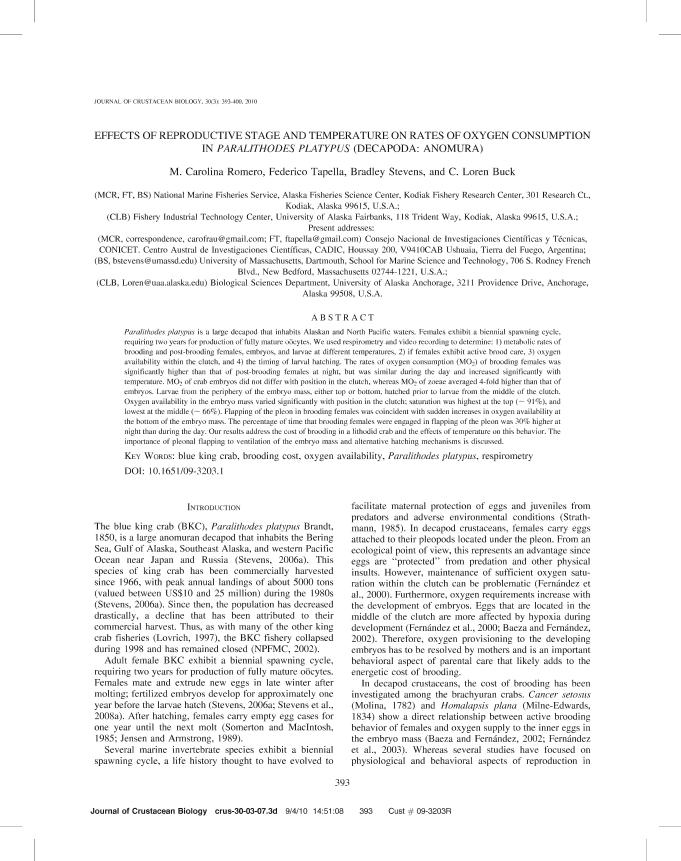Artículo
Effects of reproductive stage and temperature on rates of oxygen consumption in Paralithodes platypus (Decapoda: Anomura)
Fecha de publicación:
07/2010
Editorial:
Oxford University Press
Revista:
Journal of Crustacean Biology
ISSN:
0278-0372
e-ISSN:
1937-240X
Idioma:
Inglés
Tipo de recurso:
Artículo publicado
Clasificación temática:
Resumen
Paralithodes platypus is a large decapod that inhabits Alaskan and North Pacific waters. Females exhibit a biennial spawning cycle, requiring two years for production of fully mature oöcytes. We used respirometry and video recording to determine: 1) metabolic rates of brooding and post-brooding females, embryos, and larvae at different temperatures, 2) if females exhibit active brood care, 3) oxygen availability within the clutch, and 4) the timing of larval hatching. The rates of oxygen consumption (MO2) of brooding females was significantly higher than that of post-brooding females at night, but was similar during the day and increased significantly with temperature. MO2 of crab embryos did not differ with position in the clutch, whereas MO2 of zoeae averaged 4-fold higher than that of embryos. Larvae from the periphery of the embryo mass, either top or bottom, hatched prior to larvae from the middle of the clutch. Oxygen availability in the embryo mass varied significantly with position in the clutch; saturation was highest at the top (~ 91%), and lowest at the middle (~ 66%). Flapping of the pleon in brooding females was coincident with sudden increases in oxygen availability at the bottom of the embryo mass. The percentage of time that brooding females were engaged in flapping of the pleon was 30% higher at night than during the day. Our results address the cost of brooding in a lithodid crab and the effects of temperature on this behavior. The importance of pleonal flapping to ventilation of the embryo mass and alternative hatching mechanisms is discussed.
Archivos asociados
Licencia
Identificadores
Colecciones
Articulos(CADIC)
Articulos de CENTRO AUSTRAL DE INVESTIGACIONES CIENTIFICAS
Articulos de CENTRO AUSTRAL DE INVESTIGACIONES CIENTIFICAS
Citación
Romero, Maria Carolina; Tapella, Federico; Stevens, Bradley; Loren Buck, C.; Effects of reproductive stage and temperature on rates of oxygen consumption in Paralithodes platypus (Decapoda: Anomura); Oxford University Press; Journal of Crustacean Biology; 30; 3; 7-2010; 393-400
Compartir
Altmétricas




